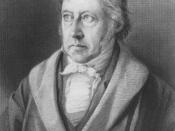The theories of Karl Marx and his critique of the capitalist economic system were quite revolutionary at the time for many reasons. Marx felt traditional philosophers affirmed simply abstract ideas of how society works and interacts with its environment. Marx despised traditional philosophy because of this and like Charles Darwin, G. Hegel, and few others before him, Marx based his theories on the fact that human history is governed by scientific law. Marx in his theories outlined definite rules that govern how society progresses based on the past as well as the current situation. He outlined specifically how and why major changes in society occur, have occurred, and why the final major change should and will soon take place.
Like Hegel, Marx believed that history was a progressive development based on objective principles. Marx also adopted the dialectic idea of Hegel, in which the counter action of opposing forces provides the thrust for the advancement of society to a final proper and perfect state.
Hegel was the opposite of Marx, a naturalist and spiritualist who believed that from the universal idea of god human existence unfolded. The clashing of human ideas, he believed, advanced society. For Marx, a strict materialist who resented all things metaphysical, the idea of god was a human creation and all its effects were illusions. He felt that the beginning of history and its advancement and ideas stem from the social and economic situation of man. For him, it was the clash of classes that advanced history. It is from these ideas and an examination of history that Marxism comes, the assertion that an unequal and exploitative economic and hence social system leads to revolution by the disadvantaged class; that the division of labor and social class system itself is the cause for revolution, and that...


